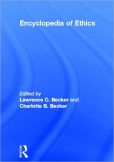
Click on title to access these electronic books:
 Cambridge Dictionary of Philosophy
by
Robert Audi (Editor)
Cambridge Dictionary of Philosophy
by
Robert Audi (Editor)
 Encyclopedia of Ethics
by
Lawrence C. Becker (Editor); Charlotte B. Becker (Editor)
Encyclopedia of Ethics
by
Lawrence C. Becker (Editor); Charlotte B. Becker (Editor)
An incredible book spanning the ages and ways we "put together" the world in examining and imagining it and ourselves - a lifelong read and re-read



